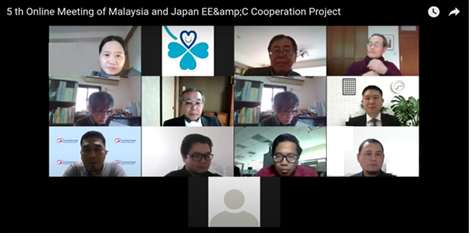Holding of 5th Online meeting with Malaysia relating to energy conservation support
<Meeting>
Under the instruction and financial support of the Ministry of Economy, Trade and Industry (METI), the Energy Conservation Center, Japan (ECCJ) has been developing the bilateral energy conservation cooperation project with Malaysia in the current fiscal year. Due to the spread of COVID-19 it has been difficult to dispatch experts overseas and to conduct invited training in Japan during FY2020, so that four online meetings and one online workshop have been held until now. On February 19, 2021, a fifth online meeting was held with representatives of Malaysia’s Ministry of Energy and Natural Resources and other organizations, who are the counterparts of METI/ECCJ, in order to evaluate and investigate the results of the online Workshop that was held over a four-day period during December 2020.

1. Meeting participants:
(1) Malaysia: Two persons from the Ministry of Energy and Natural Resources (MENR), one person from the Sustainable Energy Development Authority (SEDA), and two persons from the Energy Commission (EC)
(2) Japan: Six persons from the ECCJ International Cooperation Division
2. Review of online workshop:
ECCJ conducted exchanges of opinions with the Malaysian side relating to the evaluation of the results of the BECMY7 Online Workshop that was held in December 2020. The main issues confirmed and agreed are shown next.
(1) Training duration: According to the evaluation results, the four-day period consisting of four hours each day was considered to be appropriate.
(2) Number of trainees: Although the initial plan was to have a maximum of 15 persons, requests were received to allow more trainees. As the course was held online, an increased number of 22 persons were accepted for the Workshop.
(3) Breakdown of participants: The persons participating in the Workshop belong to 11 institutions related to energy conservation training.
(4) Online lectures: Several opinions were expressed that it was hard to understand the lecture materials when they could only be viewed on the PC screen during the lectures. Accordingly, from part-way through the course the lecture materials were sent to the participants to pre-study and review afterwards.
(5) Evaluation of lecture contents: Comments were received including that there were lectures on heat-related energy theory which were difficult, and there were requests to have explanations of application case studies utilizing practical aspects of theory. It is therefore necessary to make some revisions.
(6) Confirmation of Malaysian country report: Regarding the contents describing the Impact of the EE&C Act which are currently being formulated, ECCJ could confirm the year when the target numbers of certified energy managers and certified energy auditors would be achieved.
(7) Information on Malaysian EE&C Act: It is planned that the Act will be presented to the Malaysian parliament between the end of 2021 and beginning of 2022. For the reason that four hundred Type 2 Certified Energy Managers who are also knowledgable about heat-related technologies will be needed as soon as the Act is enacted, ECCJ understood that it would be necessary to complete the related Type 2 Certified Energy Manager training system in 2021.

